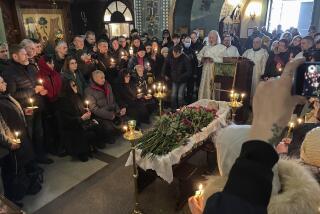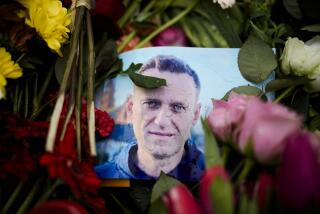Russian Panel Advises Burying Last Czar in St. Petersburg
MOSCOW â Russiaâs last czar and the family and servants who died with him should be buried with imperial grandeur in their native St. Petersburg on July 17--80 years to the day after their execution--a special state panel ruled Friday.
The recommendation to Russian President Boris N. Yeltsin was more than six tortured years in the making and still awaits the head of stateâs final endorsement before invitations can go out to the kings and queens of Europe for a long-awaited proper funeral for the last of the Romanovs.
But the commissionâs declaration that bones unearthed in 1991 are beyond any doubt those of Czar Nicholas II, Empress Alexandra, three of their daughters and four servants sent the first convincing signal that the political battle over their burial is over.
If Yeltsin responds with dispatch, as he has promised, this summer will see a soul-cleansing ritual unrivaled in this country in the 20th century when Russians symbolically bury not just the Romanovs but the sins of their Communist past.
Edvard S. Radzinsky, a prominent playwright, biographer and member of the government commission whose task was to identify the bones and plan for their interment, likened the decision to raising the lost city of Atlantis, saying that it will restore St. Petersburg, called Leningrad in the Soviet era, to its pre-revolutionary glory.
âThis is the completion of history, because at the end of the century they have returned,â Radzinsky, appearing on television, said of the Romanovs. âAnd the Russia that disappeared with them has returned too, and the city that disappeared, whose very name disappeared, has returned. This is significant, and it is right.â
The czarist family and its loyal retinue were taken captive and moved to house arrest in the Ural Mountains city of Yekaterinburg during the tumultuous aftermath of the 1917 Bolshevik Revolution. In the early morning hours of July 17, 1918, they were shot by a 12-man firing squad in a tiny basement room of a confiscated merchantâs dwelling known as Ipatiev House.
The bodies were hidden and details of the slayings covered up for decades, until the social reforms of the late 1980s allowed two amateur sleuths to come forward and disclose that they had located the Romanovsâ remains near Yekaterinburg in 1979.
Since their exhumation in 1991, the desiccated bones have been subjected to successive indignities, from scientific probing to ghoulish ogling in the Yekaterinburg morgue, which has become a macabre museum.
A three-city battle for the right to bury the Romanovs had been holding up the special commissionâs decision, as the leaders of Moscow, St. Petersburg and Yekaterinburg lobbied over the remains.
First Deputy Prime Minister Boris Y. Nemtsov, who has headed the commission for the past few months, had openly sparred with the Yekaterinburg regionâs governor, Edvard Rossel, who has covetously guarded the czarist bones that still remain in his possession and frustrated the work of forensic pathologists who wanted to study the remains in Moscow.
*
After the commissionâs final meeting, Nemtsov told reporters that 16 panel members had supported burial in the Peter and Paul Fortress in St. Petersburg, where every czar since Peter the Great has been laid to rest. Four pushed for Yekaterinburg, and only Moscow Mayor Yuri M. Luzhkov voted for holding the funeral in the nearly completed Christ the Savior Cathedral that has become the hero project of his administration.
Burying servants along with the royals is a break with imperial tradition, but Nemtsov said that most commission members believed that recognition should be made of the retinueâs self-sacrifice in staying with what they must have known was a family destined to die.
Yeltsin promised two weeks ago to act within days of the commission report, and Nemtsov and other members have been urging a swift endorsement to allow time for proper preparation of the last rites that are likely to draw the crowned heads of Europe.
Some panel members had preferred a burial date of March 1, in conjunction with the Russian Orthodox observance of Atonement Sunday. But the commission decided there would be too little time remaining to organize a state funeral.
The Russian Orthodox Church has yet to rule on the question of whether Nicholas should be canonized as a holy martyr--another long-delayed decision the panel finally decided it would no longer wait for.
More to Read
Sign up for Essential California
The most important California stories and recommendations in your inbox every morning.
You may occasionally receive promotional content from the Los Angeles Times.











